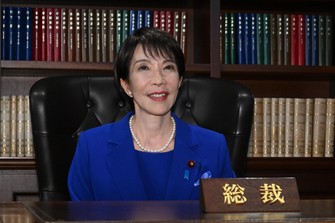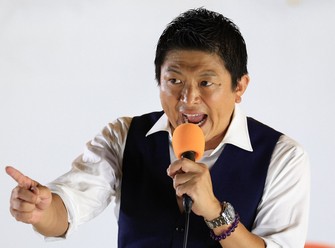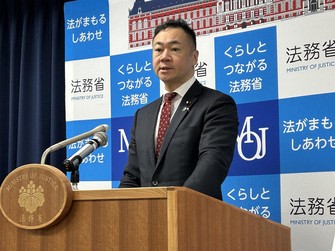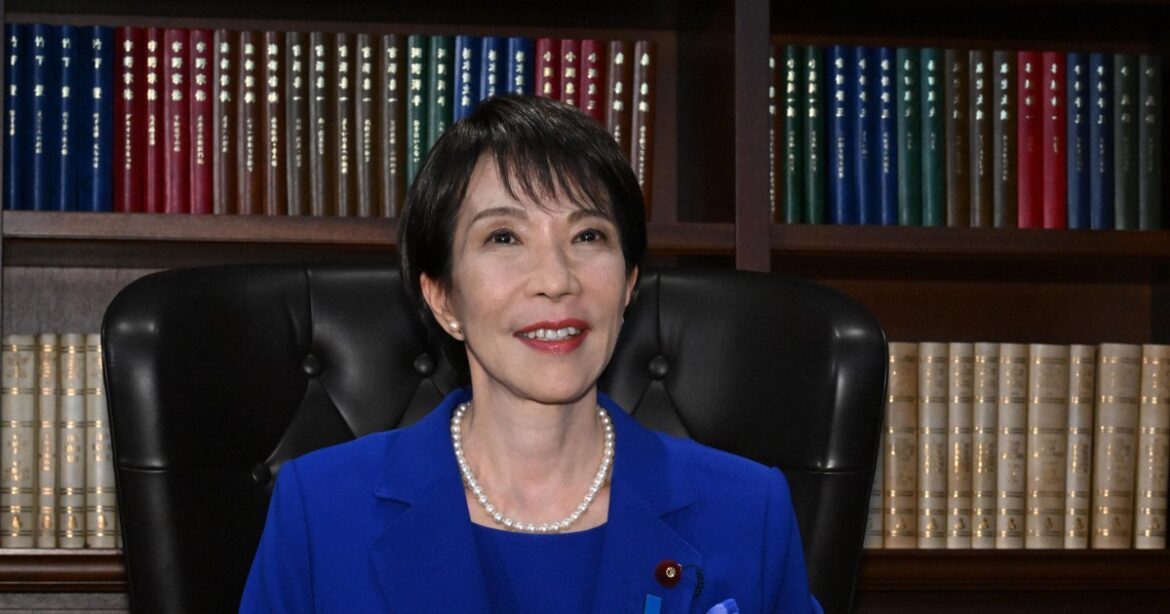
Newly elected ruling Liberal Democratic Party leader Sanae Takaichi sits in the party president’s office in Tokyo on Oct. 4, 2025. (Mainichi/Naoki Watanabe)
TOKYO — In the recent ruling Liberal Democratic Party (LDP) leadership race, all five candidates — including eventual winner, former Economic Security Minister Sanae Takaichi — called for stricter policies regarding foreigners.
Following the July House of Councillors election, where the “Japanese First” Sanseito party made gains, Japan’s policy on foreigners become a major point of contention in the LDP presidential election. But when politicians focus only on tightening regulations, they risk fueling xenophobia. With the number of foreign residents in Japan increasing, what kind of approach is needed? The Mainichi Shimbun spoke with Naoko Hashimoto, associate professor at International Christian University and an expert on foreigner policies.
Mainichi: In the LDP leadership race, all five candidates, including Takaichi, called for stricter foreigner policies.
Naoko Hashimoto: They are trying to project an image of being “tough on foreigners who don’t follow the rules.” Of course, in a country of laws, illegal acts should be dealt with regardless of nationality, and steps should be taken to prevent them. But it is simply not the case that enforcement is not functioning specifically when it comes to foreigners.
Illegal overstays are often highlighted, but the current number is just a quarter of the peak. The figure — just over 70,000 — is far lower than in Europe or the U.S. Considering that about 40 million people, including tourists, enter Japan each year, Japan’s border management is in fact working well.
That the candidates reiterated the talking points of even the conventional LDP’s conservative wing was likely a reaction to the surge of the “Japan First” Sanseito party in the July upper house election. Still, I think their understanding is somewhat off.
The LDP government has accepted many foreign workers to make up for labor shortages, but has dodged questions by saying, “This isn’t an immigration policy.” The systems for Japanese people and foreign residents living together in society are half-baked, and explanations to the public have been insufficient. I think this has led to some voters losing trust and moving away from the LDP.
M: So that’s not really the issue we should be focusing on now?
NH: Currently, foreigners make up 3% of the population, but Justice Minister Keisuke Suzuki has projected that “by around 2040, it could reach 10%.” We need to start discussing now how to smoothly transition to such a society.
In August, a private study group led by the justice minister released a summary of issues regarding foreigner acceptance, emphasizing the need to consider “social integration” for a society where everyone lives together. This direction is important.
M: So what specific policies are needed to help foreigners integrate into local communities?
NH: First, foreigners need to learn Japanese. They also need to learn about Japanese laws, culture, rules and norms.
To live in Japan long-term, being able to communicate in Japanese is essential. It’s also important for self-fulfillment and for protecting one’s rights against exploitation by employers. We need to build a system for Japanese language education. The question is how to fund it — through public money, personal contributions or both. Until now, NPOs and local governments have taken the lead, and cooperation with them will remain vital. The roles and responsibilities of the national government, local governments and employers must be clarified.
To teach norms, among other things, we need to provide opportunities for cultural orientation. We should decide who will run these programs, clearly explain what is expected, and make the information easy to understand. We also need to motivate foreigners to participate.

In this July 19, 2025, file photo, Sanseito party leader Sohei Kamiya gives a campaign speech the day before the House of Councillors election, in Tokyo’s Minato Ward. (Mainichi/Daiki Takikawa)
M: Some politicians argue that Japan should limit the number of foreigners it accepts.
NH: In reality, there has never been unlimited acceptance. The “Specified Skilled Worker (i)” status introduced six years ago, and the new training employment system set to replace Japan’s technical intern training program in two years, both have caps.
At the same time, from a social integration perspective we need to clarify what level of Japanese language ability is required at entry and after arrival for each visa status. This should be worked out in consultation with industries.
Labor shortages due to population decline are severe, especially in rural areas. Foreigners are essential to sustaining Japan’s social security system. That is a fundamental policy premise.
M: Japan is still reluctant to accept refugees, lagging far behind Europe and the United States.
NH: While the recent revision of the Immigration Control and Refugee Recognition Act has effectively limited the number of times one can apply for refugee status, the creation of refugee determination guidelines two years ago was a step forward. It’s been over 40 years since Japan joined the Convention Relating to the Status of Refugees. I hope the guidelines will continue to be updated as needed. It’s crucial that what’s written in the guidelines is actually implemented in real refugee determinations.
The introduction of a “complementary protection” system is also a positive step, as it guarantees almost the same rights as those granted to recognized refugees.
I do have concerns about the revised immigration act, but if Japan had first implemented refugee assessments in line with the guidelines for a few years and ensured that those who should be protected were protected, there would have been less criticism.
It’s also disappointing that Japan’s “third-country resettlement” program, which accepts refugees from neighboring countries in Asia, is still limited to just a few dozen people a year.
When the Taliban took control of the Afghan capital Kabul in 2021, Japan failed to rescue most of the local staff who had worked for the Japanese government. I believe this was a loss for Japan’s national interests.

Justice Minister Keisuke Suzuki announces to reporters that the new training employment system for foreign workers will go into effect in April 2027, at the ministry in Tokyo’s Chiyoda Ward on Sept. 26, 2025. (Mainichi/Kenji Tatsumi)
M: Online, baseless criticism of foreigners is rampant, and there are concerns about growing xenophobia. What is needed for Japanese and foreigners to live together as neighbors?
NH: People tend to distrust those they can’t communicate with. If residents don’t know what foreigners are thinking, their sense of caution increases. That’s why Japanese language education is needed.
When I was in the United Kingdom, I saw a TV program where a far-right individual, after cheering for a sports team alongside Muslims they disliked, ended up saying they were good guys. This is an example of “contact theory” — spending time together and getting to know each other reduces fear. I think it’s good to create opportunities for daily interaction, like picking up trash together or participating in disaster drills.
I also think overtourism is fueling some of the resentment toward foreigners. Measures like separating routes for tourists and locals during commuting times could help.
M: Japan has only recently begun full-fledged acceptance of foreigners.
NH: Other countries have accumulated both successes and failures, and there is a wealth of knowledge to draw from. In Japan, municipalities like Hamamatsu, Shizuoka Prefecture, Toyota in Aichi Prefecture, and Oizumi in Gunma Prefecture have long had large foreign populations. We should learn from municipalities with experience.
(Interviewed by Kazumi Kitamura, Editorial Board)
Profile
Naoko Hashimoto has a Ph.D. in political science, and has worked at the Permanent Mission of Japan to the United Nations, the International Organization for Migration, and the Office of the United Nations High Commissioner for Refugees. Since April 2024, she has been an associate professor at International Christian University. Her concentrations include migration and refugee policy, international refugee law, and international organizations. She is the author of a volume whose title translates to “Why Accept Refugees?” During the July upper house election, she posted on social media about statements regarding foreigners, using data to clarify the facts.


AloJapan.com